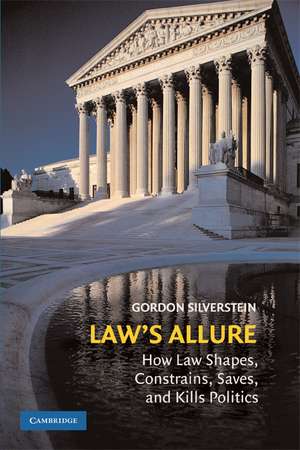Law's Allure: How Law Shapes, Constrains, Saves, and Kills Politics
Autor Gordon Silversteinen Limba Engleză Paperback – 13 mai 2009
| Toate formatele și edițiile | Preț | Express |
|---|---|---|
| Paperback (1) | 225.58 lei 6-8 săpt. | |
| Cambridge University Press – 13 mai 2009 | 225.58 lei 6-8 săpt. | |
| Hardback (1) | 341.93 lei 6-8 săpt. | |
| Cambridge University Press – 8 feb 2009 | 341.93 lei 6-8 săpt. |
Preț: 225.58 lei
Nou
Puncte Express: 338
Preț estimativ în valută:
43.17€ • 44.90$ • 35.64£
43.17€ • 44.90$ • 35.64£
Carte tipărită la comandă
Livrare economică 15-29 aprilie
Preluare comenzi: 021 569.72.76
Specificații
ISBN-13: 9780521721080
ISBN-10: 0521721083
Pagini: 334
Ilustrații: 7 b/w illus.
Dimensiuni: 150 x 224 x 28 mm
Greutate: 0.44 kg
Editura: Cambridge University Press
Colecția Cambridge University Press
Locul publicării:New York, United States
ISBN-10: 0521721083
Pagini: 334
Ilustrații: 7 b/w illus.
Dimensiuni: 150 x 224 x 28 mm
Greutate: 0.44 kg
Editura: Cambridge University Press
Colecția Cambridge University Press
Locul publicării:New York, United States
Cuprins
Introduction: law's allure and American politics; Part I. Law's Allure: Why, and Why Now, and Why it Matters: 1. Law's allure: motives, incentives, patterns, and process; 2. Why now? The expansion and acceleration of law's allure; 3. Why it matters: law is different - a theory of precedent; Part II. Law's Allure: Patterns, Process, and Cautionary Tales: 4. Poverty and abortion: the risks and rewards of a judicial strategy; 5. Environmental regulation: a constructive process; 6. Campaign finance: a de-constructive process; 7. When the court says yes - and no: the special prosecutor, budget control, and line item vetoes; 8. When the court is reluctant to intervene: war powers; Part III. Law's Allure: Costs and Consequences: 9. Tobacco: the promise and peril of law's allure; Conclusion: law's allure and American politics: for better - and worse.
Recenzii
“Law’s Allure is a masterful treatment of the causes and consequences of the juridification of American politics. Beautifully written and displaying Silverstein’s encyclopedic knowledge of American constitutional law and practice, the book helps us understand how the courts can both enable and disable our politics under different circumstances. Silverstein integrates both abstract principle and bare-knuckle politics into the account, resulting in a volume that is at the same time profound and accessible. A major contribution that will enlighten both scholars and the informed public.”
-- Tom Ginsburg, The University of Chicago Law School
“Professor Silverstein provides an original and compelling analysis of the complex relationships between law and politics. His insights that juridification in the United States is on the rise, that juridification is more than government by judiciary, and that escaping from politics has numerous hidden costs are interesting, important and likely to provoke a good deal of conversation both within and without political science.”
-- Mark Graber, University of Maryland
“Gordon Silverstein has given us a superb analysis of juridification, the messy interaction of supposedly objective legal rules with partisan interests that often produce public policy. Through both general reasoning and close studies of specific cases, he demonstrates how these forces noisily, and sometimes angrily, engage to create not a seamless web but a jig-saw puzzle whose jagged pieces never fit neatly together. Neither students of public law nor public policy can afford to miss this splendid book.”
-- Walter F. Murphy, Princeton University
“Law’s Allure is a breathtakingly good book. Tracing through a substantial number of important case studies ranging from abortion and school desegregation through campaign finance and environmental litigation to the tobacco cases and more, Gordon Silverstein gives us a new paradigm for thinking about the role of courts in American politics, one that is more complete, convincing, and persuasive than we have ever had before in a single volume.”
-- Kim Lane Scheppele, Princeton University
“A valuable contribution to the next generation of studies on constitutional politics. With well-chosen case studies and a useful analytical framework, Gordon Silverstein helps identify the whys, hows, and so-whats of interactions between politicians and judges in shaping public policy.”
-- Mark Tushnet, Harvard Law School
“Law’s Allure: How Law Shapes, Contrains, Saves and Kills Politics provides an original and compelling analysis of the complex relationships between law and politics. Professor Silverstein’s insights that juridification in the United States is on the rise, that juridification is more than government by judiciary, and that this escape from politics has numerous hidden costs are interesting and important. The case studies are well written and informative, the research is solid, and the conclusions likely to provoke a good deal of conversation both within and without political science…Professor Silverstein provides a far more nuanced account of the relationship between law and politics than found in the existing political science literature.”
Mark Graber, Balkinization blog
"Students of both judicial process and public policy will find this well-written, fully documented book to be a worthwhile addition to their libraries. Recommended." - CHOICE
"Silverstein ends his book by observing that the failure to fully recognize and understand the phenomenon of juridification and its consequences is in part a product of the "artificial divide that has grown up between those who study law and those who study government and politics"'5 (283). He argues that this divide has narrowed, but the two schools are still running on parallel tracks rather than working together to understand "how law and politics interact, shape, and frame each other" (284). Law's Allure does a fine job of bridging the gap between the two. It is not, as Silverstein rightly observes, "meant to be the last word on the subject" of juridification (285). And as Tocqueville's words illustrate, it is not the first word on the subject either. But it is a valuable addition to the conversation."
Journal of Legal Education, Paul Horwitz
"Through a discussion of the Supreme Court’s growing breadth of engagement with political policy-making and a series of careful case studies, Silverstein provides an insightful “roadmap” for future scholars interested in exploring the causes and consequences of judicial policy-making. Indeed, the analyses in this book should provide considerable grist for the mill as this line of literature moves forward."
-Tom S. Clark, Emory University
"Gordon Silverstein, a political scientist at Berkeley, has written a fine book about the “juridification” of American politics—the resort to Courts to settle issues that the political process, through electoral action, persuasion, bargaining and compromise, might have resolved...He does not take a simple view, falling prey to a one-dimensional judgment of which Branch is overreaching or displaced from its natural functions."
-Bob Bauer, Chair of the Political Law Group of Perkins Coie LLP
-- Tom Ginsburg, The University of Chicago Law School
“Professor Silverstein provides an original and compelling analysis of the complex relationships between law and politics. His insights that juridification in the United States is on the rise, that juridification is more than government by judiciary, and that escaping from politics has numerous hidden costs are interesting, important and likely to provoke a good deal of conversation both within and without political science.”
-- Mark Graber, University of Maryland
“Gordon Silverstein has given us a superb analysis of juridification, the messy interaction of supposedly objective legal rules with partisan interests that often produce public policy. Through both general reasoning and close studies of specific cases, he demonstrates how these forces noisily, and sometimes angrily, engage to create not a seamless web but a jig-saw puzzle whose jagged pieces never fit neatly together. Neither students of public law nor public policy can afford to miss this splendid book.”
-- Walter F. Murphy, Princeton University
“Law’s Allure is a breathtakingly good book. Tracing through a substantial number of important case studies ranging from abortion and school desegregation through campaign finance and environmental litigation to the tobacco cases and more, Gordon Silverstein gives us a new paradigm for thinking about the role of courts in American politics, one that is more complete, convincing, and persuasive than we have ever had before in a single volume.”
-- Kim Lane Scheppele, Princeton University
“A valuable contribution to the next generation of studies on constitutional politics. With well-chosen case studies and a useful analytical framework, Gordon Silverstein helps identify the whys, hows, and so-whats of interactions between politicians and judges in shaping public policy.”
-- Mark Tushnet, Harvard Law School
“Law’s Allure: How Law Shapes, Contrains, Saves and Kills Politics provides an original and compelling analysis of the complex relationships between law and politics. Professor Silverstein’s insights that juridification in the United States is on the rise, that juridification is more than government by judiciary, and that this escape from politics has numerous hidden costs are interesting and important. The case studies are well written and informative, the research is solid, and the conclusions likely to provoke a good deal of conversation both within and without political science…Professor Silverstein provides a far more nuanced account of the relationship between law and politics than found in the existing political science literature.”
Mark Graber, Balkinization blog
"Students of both judicial process and public policy will find this well-written, fully documented book to be a worthwhile addition to their libraries. Recommended." - CHOICE
"Silverstein ends his book by observing that the failure to fully recognize and understand the phenomenon of juridification and its consequences is in part a product of the "artificial divide that has grown up between those who study law and those who study government and politics"'5 (283). He argues that this divide has narrowed, but the two schools are still running on parallel tracks rather than working together to understand "how law and politics interact, shape, and frame each other" (284). Law's Allure does a fine job of bridging the gap between the two. It is not, as Silverstein rightly observes, "meant to be the last word on the subject" of juridification (285). And as Tocqueville's words illustrate, it is not the first word on the subject either. But it is a valuable addition to the conversation."
Journal of Legal Education, Paul Horwitz
"Through a discussion of the Supreme Court’s growing breadth of engagement with political policy-making and a series of careful case studies, Silverstein provides an insightful “roadmap” for future scholars interested in exploring the causes and consequences of judicial policy-making. Indeed, the analyses in this book should provide considerable grist for the mill as this line of literature moves forward."
-Tom S. Clark, Emory University
"Gordon Silverstein, a political scientist at Berkeley, has written a fine book about the “juridification” of American politics—the resort to Courts to settle issues that the political process, through electoral action, persuasion, bargaining and compromise, might have resolved...He does not take a simple view, falling prey to a one-dimensional judgment of which Branch is overreaching or displaced from its natural functions."
-Bob Bauer, Chair of the Political Law Group of Perkins Coie LLP
Notă biografică
Descriere
Law's Allure explains how, when, and why America's reliance on legal rules and judicial decisions shapes, constrains, saves, and sometimes even kills politics.












